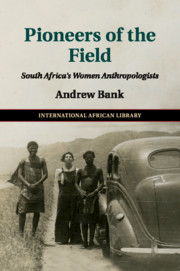Book contents
- Pioneers of the Field
- The International African Library
- Pioneers of the Field
- Copyright page
- Dedication
- Contents
- Figures
- Book part
- Introduction: rethinking the canon
- 1 Feminizing the foundational narrative: the collaborative anthropology of Winifred Tucker Hoernlé (1885–1960)
- 2 An adopted daughter: Christianity and anthropology in the life and work of Monica Hunter Wilson (1908–1982)
- 3 Anthropology and Jewish identity: the urban fieldwork and ethnographies of Ellen Hellmann (1908–1982)
- 4 ‘A genius for friendship’: Audrey Richards at Wits, 1938–1940
- 5 Historical ethnography and ethnographic fiction: the South African writings of Hilda Beemer Kuper (1911–1992)
- 6 Feminizing the discipline: the long career of Eileen Jensen Krige (1904–1995)
- Conclusion: a humanist legacy
- Bibliography
- Index
- Series page
- References
Bibliography
Published online by Cambridge University Press: 05 August 2016
- Pioneers of the Field
- The International African Library
- Pioneers of the Field
- Copyright page
- Dedication
- Contents
- Figures
- Book part
- Introduction: rethinking the canon
- 1 Feminizing the foundational narrative: the collaborative anthropology of Winifred Tucker Hoernlé (1885–1960)
- 2 An adopted daughter: Christianity and anthropology in the life and work of Monica Hunter Wilson (1908–1982)
- 3 Anthropology and Jewish identity: the urban fieldwork and ethnographies of Ellen Hellmann (1908–1982)
- 4 ‘A genius for friendship’: Audrey Richards at Wits, 1938–1940
- 5 Historical ethnography and ethnographic fiction: the South African writings of Hilda Beemer Kuper (1911–1992)
- 6 Feminizing the discipline: the long career of Eileen Jensen Krige (1904–1995)
- Conclusion: a humanist legacy
- Bibliography
- Index
- Series page
- References
- Type
- Chapter
- Information
- Pioneers of the FieldSouth Africa's Women Anthropologists, pp. 284 - 308Publisher: Cambridge University PressPrint publication year: 2016



